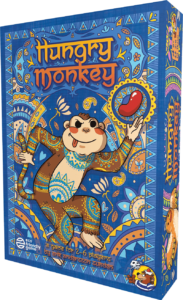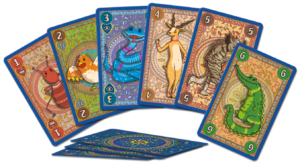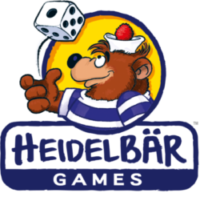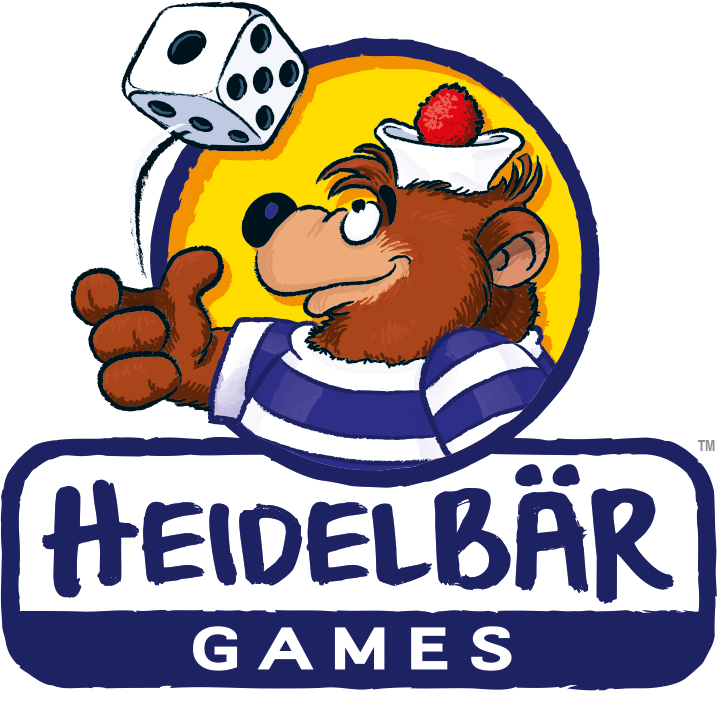
Erik A. SundénHeidelBAER NewsInfoInterviewsNewsour game designers
INTERVIEW: Erik Andersson Sundén

Erik Andersson Sundén, born 1979 in Sweden, is an applied nuclear physicist and game designer. He has played and made games as long as he can remember. For a while he was creating RPG content for his friends. The past 10 years he has been designing board and card games on a more regular basis. AEG has previously published his game Whirling witchcraft and now his latest design Hungry Monkey is published by HeidelBÄR Games. Hungry Monkey is a card game based on the traditional card game Palace. In Hungry Monkey, some of the cards have effects to manipulate your hidden row.
We asked Erik to answer a few questions:

- This year your first two games hit the market. How did you pull off this trick as an unpublished designer?
Ha ha! I visited Spiel in 2019 and had more than 30 meetings with publishers in two and a half days. I showed the publishers some of my designs (and some designs of friends). My main mission for that trip was to get my design Whirling Witchcraft a publisher and I succeeded. A lucky biproduct of that trip was that I got to meet a lot of lovely people in the industry and I stayed in contact with several of them over the coming years. About one year later I spoke to HeidelBÄR games about one of my designs, Collectors, it was too much for you and asked me if I had something lighter. I immediately showed you Hungry Monkey and that eventually lead to this second contract.
- What is your story with boardgames? When did you decide it is about time for your own games?
I started creating games already as a child. My parents must have had really good patience since they endured all of those roll and move games back in the days. I’ve continued to play board games and role playing games ever since. About ten years ago I got this weird idea that I wanted to create a worker placement game with simultaneous action selection in it. And after I met with the Swedish design community I was hooked. Now its harder for me NOT to think about games all the time than it is to think about games.
- Can you tell us a bit about the board game culture in Sweden? Is playing a common hobby or mainly for kids and families?
Playing games is a growing hobby in Sweden. For a long time, it has been mostly a family business among most people. But the hobby gaming scene has constantly grown the past 15-20 years and it is becoming more and more common to play games.
- Hungry Monkey is published as part of HeidelBÄR Games`radiant culture series. The game is set in India and illustrated by an Indian artist. Do you have any connection to India?
The theme of Hungry Monkey was altered from my animal theme to the Indian animal theme during the development process at HeidelBÄR games. I haven’t visited India so far, but I hope I will be able to see India before I die.
- What is that one game that has influenced you the most?
This is a tough question! I love playing games in so many different settings! In my family we’ve loved to play social deduction games, starting with The Werewolves of Miller’s Hollow going to playing an early version of The Resistance. Among my more game interested friends we’ve loved the boom of the worker placement games the past years, such as Caylus and Agricola, but we also enjoy great plain-fun games such as Pitch car. But if I must choose one game that taught me that games can be so much more than I ever had imagined, I choose Drakborgen (rereleased as DungeonQuest by Games Workshop). Drakborgen was not only a game to me as a child, it was a world to explore and an adventure to experience. I learned from it that games can be anything I want them to be. Looking back at the game I realise that it is far from perfect, but I do still enjoy to play it every now and then with my children.
- Hungry Monkey is a completely new spin on the classic card concept of Shithead. What is special about it and how did you come up with it?
My younger daughter loves playing Shithead. However, she had learned a version that I wasn’t too fond of. So, I suggested to her that we make our own version of Shithead. In our version of the game, I suggested that each card should have an animal on it and the bigger the value of the card, the bigger the animal should be. We both enjoyed the idea of having a mouse as 1 and an elephant as 10. We quickly decided that since elephants are said to be afraid of mice, the mouse cards should be playable on the elephants. And so the game, the called Big Bigger Mouse, was born. My daughter enthusiastically suggested different special effects for many of the cards and we tried them out. We discarded a few and kept some. We especially enjoyed the special abilities that altered the secret row. We iterated the game a few times for a week or so. We both liked it and my daughter showed it to her friends who all enjoyed it. Slowly we started to realise that our remake was not only enjoyed by us but also by others. - You are a physicist. Does your day job influence the way you design games?
Yes, it does. The iterative process of game design reminds me quite a lot of how experiments are done in physics: make a hypothesis and test it. Make another similar experiment and try it all over again. The same goes for the iterative playtesting of game design.
- In playtesting the logic of the game mechanics is tested, the balance of effects, etc. but you also have to make sure the players are having fun. How do you measure such a vague aspect, and what steps do you take, if a game isn’t enough fun in playtesting?
It is one of those things that I’ve started to observe more and more as a designer. I take notes when my playtesters are laughing. Why did they laugh? I take notes when they grumble and why they grumble. The emotions of the players are becoming more and more important to me as a designer the more I design. I look forward to my coming designs where I think these insights will be used even more.
- What is your personal long term favorite game and what do you play for fun at the moment?
I’ve played Agricola so many times and I love it to bits. I haven’t played it in a year or so. But it is a game that I love to play slowly over a night together with friends. For fun, I have recently played Spicy quite a lot. I acquired it at Spiel 21, and was happy to have Roland Goslar explain the game intricacies to me. Roland developed both Spicy and Hungry Monkey. Oh, now I start to long for going to Spiel 22! I have so many prototypes that I want to show to all publishers, I just need to tweak them a liiiiitle bit more.
Juni, 2022.

